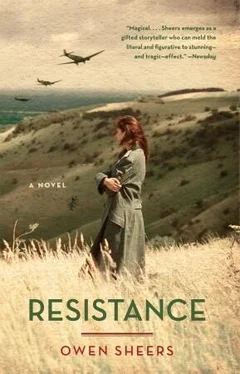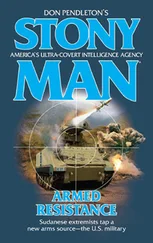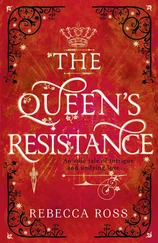Sarah stood on the top of the Hatterall ridge and looked back towards the valley, but she could no longer see it. There was nothing but the night below her and the stars and clouds above. Adjusting the strap of her bag and tightening her coat about her waist, she walked on, northwest along the ridge, along the border of two countries, the wind flinging itself around her. She hadn’t brought any food or water and the summer nights at this height were still cold. She knew she didn’t have much time, a couple of days, perhaps, but she also knew this was no longer important. It was the looking that mattered. The belief and the looking. These were all that were left now, and that was why she walked on along the ridge, blind into the night, clutching her bag tightly to her chest with the accounts book of her letters inside, the last of its pages still unwritten.
Private Jonathan Stevens of the newly formed SS Albion Division stepped over the bodies of the two dogs they’d found last night, then cautiously pushed open the front door of the farmhouse with the barrel of his rifle. It was the morning after the raid and most of the company had already left the valley. Just a small unit had stayed behind to go back through the houses looking for intelligence or any documents that might be used as evidence at the court martial. He stood in the doorway, scanning his rifle across the room before moving through the kitchen to look over the range and the sink. Standing at the dresser he slung his rifle over his shoulder and began to take down the books off the top shelf, fanning their pages over the table then throwing them aside. He came to the Bible last. It was heavy with a partly broken spine, so he laid it on the surface of the dresser instead. Opening the front cover he saw the list of names and dates on the inside page, the copperplate fading back through the centuries to the late 1700s. He was about to move on into the other rooms of the house when the final entry stopped him. He checked the date on his watch, June 11, then looked back at the final name and the numbers written beside it. The last date was written in a darker ink, fresher than any of the others.
Sarah Lewis, March 15, 1918–June 10, 1945
This novel is a work of fiction set in an alternative recent history. The seeds of the fictional past I’ve imagined, however, are sown in what many feared to be, at one point in time during the summer of 1940, an all too possible future.
I first heard about the plans for a British resistance organisation one summer when I was working for a builder in the Llanthony valley. We were taking the stone tiles off a barn, loading them onto a trailer behind a tractor, driving them through the valley, then fitting them to the roof of a new conversion. It was hot, repetitive work, but over those weeks, between the lifting, loading, and unloading, our conversations had the space and time to range and wander freely. One day Charles, the builder, told me how during the war some farmers in the area had been given caches of arms, which they’d hidden in underground bunkers in the hills. Should the order have come, these farmers were to leave their homes and wives and take to the Black Mountains to resist the occupying German army. It was a seductive tale and from all the stories told over those summer weeks, it was this one that lived with me as others fell away over the following years.
I was reminded of Charles’s story on the morning of September 11, 2001, when I heard a radio interview on the Today program. Papers had recently come to light detailing the real plans that had lain behind his tale of farmers as a resistance force-in-waiting. The presenter, Sue MacGregor, was interviewing George Vater. As a young man farming near Abergavenny during the war, George had been recruited into the Auxiliary Units Special Duties Section, a network of farmers, vicars, and other local people trained and prepared to run messages and spy on an occupying German force. At the end of the interview, Sue MacGregor said, “So you have no doubt, had there been an invasion, you would have repelled the lot of them?” “No,” George replied, releasing laughter from the studio. After a slight pause he continued, speaking clearly and steadily, his words cutting through, then silencing the laughter. “I’m very sorry to say, no. We were told that perhaps we would work for fourteen days, and that was our full lifetime, I presume.”
I knew George Vater. His family farmed near my parents’ house in Llanddewi Rhydderch. They also ran the local school minibus service. For seven years I was picked up at the bottom of our lane by one of George’s sons or daughters, and sometimes even by his wife or George himself. For the last four of those seven years George’s grandson sat on the bus beside me. As a lifelong supporter of the Pontypool rugby club, George had recruited me for their Colts side when I was seventeen.
George’s reply at the end of that radio interview haunted me for many years after I heard it. Eventually, together with the story Charles had told me, the idea of a British resistance organisation and what they’d been expected to do in the event of a German invasion got the better of me. Taking the opportunity of a weekend visit home, I called George and arranged to meet him the following morning at his family farm in Llanddewi.
Sitting in his living room, surrounded by cuttings, maps, and photographs, George told me that morning how, in the summer of 1940, he’d been approached by a man calling himself Tommy Atkins. He explained how Atkins had given him a sheet of German insignia to learn and told me what would have been expected of him as a member of Atkins’s Special Duties Section. George also told me where I could still find the locations of several Auxiliary Unit “operational bunkers” in the surrounding area, and he showed me a photograph (opposite) of the inaugural meeting of the Monmouthshire Auxiliary Units Association, taken after the war in December 1945.
George and the men in this photograph never had to put their training into practice as part of a British resistance force, nor did they have to test whether their forecasted life expectancy of two weeks was accurate. My conversation with George did, however, enable me to imagine a world in which the plans for such an organisation had to be realised. I’d hoped that one day George would be able to read the novel I wrote partly inspired by his experiences, but unfortunately I’m writing this on the morning of George’s funeral. I can, however, still thank George. Not just for being so generous with his memories, but also for being willing, along with the thousands of others like him, to risk everything in what would have been the darkest days in the struggle against fascism.

Inaugural meeting of the Monmouthshire Auxiliary Units Association, December 1945 .
There were, of course, many other influences upon this novel, and among them are some more seeds of fact that may be of interest. The Mappa Mundi really was removed from Hereford Cathedral and, after a stint in the cellar of Hampton Court, kept in a coal mine in Bradford-on-Avon for the duration of the war. The poet and artist David Jones, meanwhile, did live in Eric Gill’s artistic community at Capel-Y-Fin between the years of 1924 and 1927. Similarly, both von Brauchitsch’s “Proclamation to the People of Britain” and the “Guide on How Troops Are to Behave in England” are taken from a series of real Most Secret draft orders and decrees issued to senior Wehrmacht officers in September 1940.
While these notes of fact, and others, have been woven into this novel, apart from Upper Blaen and The Court, the positions, names, and number of houses in the Olchon valley, along with the characters living in them, have all been imagined. To borrow from Lawrence Durrell’s note upon the city in The Alexandria Quartet , only the valley is real.
Читать дальше













